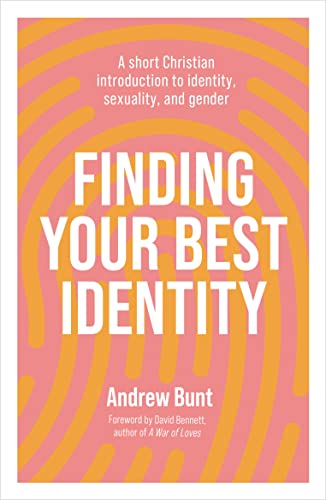What is your identity? How do you identify? Who am I?
Those aren’t the first questions to ask. At least that’s what Andrew Bunt suggests in his new book Finding Your Best Identity: A Short Christian introduction to Identity, Sexuality and Gender.
Our search for identity is a given, but sometimes we don’t ask the more important question of how: “How do I find who I am?” (4) How do I find my identity? Only when we begin to ask the question of how can we discern the question of who, and ultimately, so what?
But I’m getting ahead of myself.
Andrew Bunt was a pastor and is now the Emerging Generations Director of the UK organisation Living Out. As a young person he had experienced gender incongruence and continues to experience attraction to the same sex. When you read Finding Your Best Identity, you can tell that he draws deeply from these experiences; it is as if he’s speaking to you over a slightly steaming cup of tea, as theology, challenges and faith are weaved together in an engaging and tender tone.

Finding Your Best Identity: A Short Christian Introduction to Identity, Sexuality and Gender
Andrew Bunt
Finding Your Best Identity: A Short Christian Introduction to Identity, Sexuality and Gender
Andrew Bunt
This is Andrew Bunt’s heartfelt exploration of how identity is formed and developed. Bunt blends his personal story with careful Bible teaching and genuine cultural awareness, looking at what we believe about ourselves, what other people say about us, and what God thinks. Finding Your Best Identity is a book to start conversations and help us all understand our true identity. Ideal for those working with young people struggling with identity issues. Short but thoughtful, it is filled with gentle wisdom that serves as an opportunity to engage in an important discussion on sexuality, gender, and identity development.
A Necessary Posture
The topic of identity, sexuality, and gender is so often fraught with emotions, reactions, and assumptions. But Bunt enters the space of identity formation as a fellow disciple. Whether you trust in Jesus or not he doesn’t patronise but gives room for the reader to work things out. He understands that identity formation is real, tricky, and necessarily a process for young (if not all) people. It is no mean feat in a world that has so many contrary voices:
Who am I? For years I believed that I was a freak and a weirdo. That wouldn’t have been how I would have described myself if you’d asked me who I was; for a long time, I wasn’t even fully conscious I believed that. But deep down I did, and that belief had horrible effects on my life. (8)
Bunt doesn’t offer the often-quick fix solutions to sexual/gender experience, and demonstrates that Jesus “never allowed people to think that sin was acceptable, but he also never allowed people to believe that God didn’t or couldn’t love them.” (17) Bunt’s posture demonstrates the need for Christians to slow down and engage in these topics gently and with nuance. A reactive, angry, culture-war voice may not bear the fruit of the Spirit and can alienate young and vulnerable people from seeing the beauty of Christ.
A reactive, angry, culture-war voice may not bear the fruit of the Spirit and can alienate young and vulnerable people from seeing the beauty of Christ.
A Book that is Real
Finding Your Best Identity doesn’t exist in a make-believe world.
Firstly, it dispels conceptions that all Christians are not listening to sexual/gender minorities, containing the real voices of people who experience a wide pattern of sexual attraction or gender experiences.
You also hear a sharp rebuke for the wrong wider Christianity has done in this area: confusing cultural gender stereotypes as biblical gender expectations, and discipling young people to conform to culture (62); ignoring the inherent dignity of LGBTQ+ people who are equally made in the image of God in rhetoric and relationships; (59) and the presence of homophobia. (15)
For readers who doubt whether or not following Jesus in sexuality and gender is good and worth it, you hear a hope that is found in God—the One who navigates with us in our identity formation. Bunt says:
Christian identity allows us to engage healthily with feelings and desires … to acknowledge our feelings and desires and to respond to them and steward them in the ways that God has revealed will be the most life-giving for us. (47)
Identity in Christ or Union with Christ?
As Bunt navigates the different sources we look to for identity—within our community and peers (Chapter 2), and within ourselves (chapter 3)—he challenges assumptions and builds an argument that God is loving and true and his design is good.
When he begins to build a Christian identity defined by God he centres it not in the vague notion of “identity in Christ”[1] (42)but in the doctrine of grace and the Pauline theology of Union with Christ. This makes all the difference. It turns what might otherwise be merely intellectual, moral or cultural religion into a call to Spirit-led personal transformation that derives everything from Christ himself. [2]
Here is a book aimed at people. Whether you are in the midst of identity formation, young or old, following Jesus, on the fence about whether God’s design for sexuality and gender is good and beautiful, or whether you’re curious as to how Christians navigate this area. As a ministry worker in the space of sexuality, gender, apologetics and ministry to young people, I highly commend this book to you.
[1] See Matthew Lee Anderson’s piece: The Trouble with Talking about our “Identity in Christ,” and Greg Johnson, Still Time to Care: What We Can Learn from the Church’s Failed Attempt to Cure Homosexuality (Grand Rapids, MI: Zondervan, 2022), Chapter 17.
[2] See more on this point in my Themelios review: Samuel Wan, Review of Finding Your Best Identity: A short Christian introduction to identity, sexuality and gender, by Andrew Bunt. Themelios, (Forthcoming).














